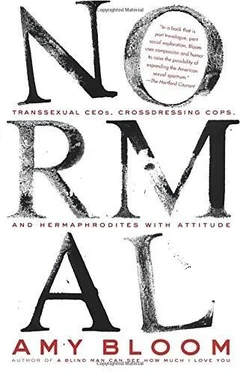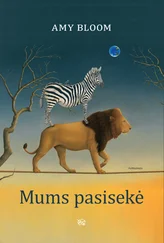Luis is a slightly built, gentle South American man, a chemist in Silicon Valley, thirty-five years old, single and bisexual, primarily involved with women.
“I was twenty-two when I went to Don Laub for my surgery,” Luis says. “It was the right thing for me — I can go to the gym, go swimming, and I don’t have to feel vulnerable or be afraid. I was always athletic, and I didn’t want to give that up. And it feels right for sex. What I perceive and what my partner perceives now match up. Inside and outside, I’m a man.
“The surgeries made a huge difference for me. I had the genital surgery, not the full phalloplasty. I don’t know what Dr. Laub calls the other one now, but that’s what I had. The easier one [the metoidioplasty]. I have days when I think about a phalloplasty, but I’d rather save my money, for travel, for my future, for investing. The gender issue isn’t at the center of my life.” He sighs.
“I don’t get the chance to talk about this, it’s not a conversation I’d have with other men. Gender is slippery. I used to see it as black and white — men, women, that’s it. I wanted to be perceived as male, in a male role, with male attributes. I don’t hold on to that anymore. Male, female — I don’t even understand that anymore. Now that I’ve been in a female body and in a male one and spent all this time thinking about this issue, I see that it’s nebulous. You can’t hold on to it and find meaning. Gender is an illusion, an illusion we cherish because we think we’ll ultimately find something clear and meaningful. And we don’t, we won’t. And I find, after all this, it doesn’t matter much.”
The four of us talk for two hours, and Loren and James cheerfully interrupt each other, disagreeing, raising their voices, picking holes in each other’s logic; Luis and I listen, and from time to time we point out the issues on which James and Loren do agree, which seems to matter to us but not to them.
They agree — they both know at first hand — that a number of transsexual men have emerged from the lesbian community, a world in which each of them could maneuver with some success but not with complete ease. “I was excluded from lesbian events even before I started the transition,” James says. “I was just too male — not butch but male. I crossed some line somehow, and everyone, the other women, felt that there were things about me, despite my female body, that were just not female.”
Loren, apparently irritated by James’s calm, even superior acquiescence to rejection by the community that was their world for so many years, adds, “The loss makes me mad, losing the women’s community. And the lack of acknowledgment. Transsexuals are never really accepted, by anyone.”
Luis says, very quietly, reluctant to antagonize the activists, “I’m not really very political. I take calculated risks, I do a little public speaking. I have a lot of other things I like to do and develop besides politics. My parents are apolitical, my whole family is. I’m not a separatist, of any kind. I find separatism ugly. I understand straight men at least as well as I understand gay women. I used to hate and fear men, at least all the ones I knew. Now I don’t. Probably you don’t have to become anatomically male to stop hating men.” He smiles. “But it is effective. I can now meet men that I can trust, I can care for.”
And his view of women?
“I was like a fly on the wall in my childhood world of girls. I grew up with girls, in their world, and I saw how they were treated. I didn’t feel like one of them, but I saw how women were disrespected, were diminished, and I haven’t forgotten that.”
We wind up talking about Virginia Woolf’s Orlando and weightlifting and fathers and children and photography. I like these men, and I know, whatever “knowing” means, that they’re men. I expected to find psychologically disturbed, male-identified women so filled with self-loathing that it had even spilled onto their physical selves, leading them to self-mutilating, self-punishing surgery. Maybe I would meet some very butch lesbians, in ties and jackets and chest binders, who could not, somehow, accept their female bodies. I didn’t meet those people. I met men. Some I liked, some I didn’t. I met bullshit artists, salesmen, computer programmers, compulsive, misogynistic seducers, pretty boys inviting seduction, cowboys, New Age prophets, good ol’ boys, shy truck drivers saving their money for a June wedding, and gentle knights. I met men.
Ira Pauly is one of the acknowledged titans of transsexual psychiatry. He is professor emeritus and former chairman of the department of psychiatry at the University of Nevada School of Medicine. In his bunkerlike office at the university, he cautions me that he hasn’t kept up with everything in the recent literature, which represents a huge body of work and new ideas. He says that he has met a few people who have had regrets after their surgery, but only a few, out of hundreds, and that whatever the etiology of transsexuality may be, there are those for whom surgery is the only true solution.
Pauly is a modest, very smart man with big hands and a UCLA plaque on his desk showing his college football history. He became chairman of the department of psychiatry partly on the strength of his pioneering research on transsexuals. He is always clear, reasonable, fair, and extremely contained. He showed strong feeling only once during our interview — when he talked about Louis Sullivan.
A female-to-male transsexual, Sullivan was also a gay man with AIDS, and he called Pauly in the late eighties in the hope of educating the professionals in the “gender community” about the difference between gender and sexual orientation: that a “real” man might prefer sex with men to sex with women; that the sexual object one prefers says nothing at all about one’s gender, or even about one’s masculinity or femininity. Sullivan encountered massive resistance, even from physicians and mental health professionals who regularly supervised and facilitated transsexual transitions. “But if you want to sleep with a man,” they said, in effect, “why not go on being a woman? It’s so easy.” As if only a nutty transsexual would believe that sex with a man, as a man, is different from sex with a man, as a woman.
In his search for treatment, Sullivan went to several gender dysphoria clinics (“gender dysphoria” meaning that the presenting complaint is one of deep unhappiness with one’s gender). For transsexuals, Ira Pauly told me, such clinics are the only gateways to reputable surgeons committed to meaningful standards of care: under the supervision of a clinic, the patient lives full-time as a member of the opposite sex for two years before surgery and receives documented treatment by a licensed mental health practitioner (the process recommended by the Harry Benjamin International Gender Dysphoria Association, an organization of gender dysphoria professionals — psychologists, social workers, psychiatrists, surgeons, endocrinologists, the occasional lawyer). Sullivan was rejected by the clinics because he not only knew that despite his female anatomy he was male, he knew that he was a gay male.
Pauly loaned me three hours of videotaped interviews he had conducted with Sullivan. The setup reminded me of public access TV: a ficus tree keeps brushing Sullivan’s ears, the carpeting clashes with the chairs, the camera occasionally seems stuck on the sock sliding down Ira Pauly’s bare shin or on Louis Sullivan’s pale hands fumbling with the mike. If you missed the sections on surgery and hormones, you would simply be moved by this increasingly gaunt, youngish, mild-mannered man so ferociously determined to make use of his AIDS death sentence to educate the rest of us.
“They said, ‘It can’t be,’ and I said, ‘It is,’ ” Sullivan says on one of the tapes. “They told me that I must not really be transsexual. After all, they thought, if I just wanted to sleep with men, why go to all the trouble? So, I told them. Again and again, until they got it.”
Читать дальше












